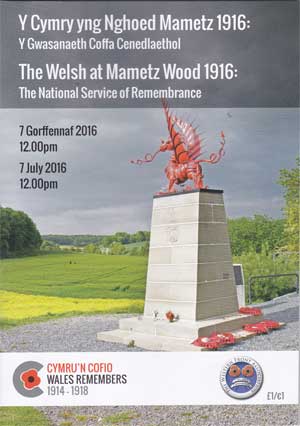
Military History Articles
Lt-Gen Jonathon Riley CB DSO PhD MA
Mametz Wood
Delivered by Lieutenant-General Jonathon Riley at the Somme Commemoration
Mae gwaedd y bechgyn lond y gwynt
A’u gwaed yn gymysg efo’r glaw
Their cry is in the wind
Their blood is in the rain
Two additional articles featured in the BBC News:
Mametz Wood and the 38th: 'What dark convulsed cacophony' »
Mametz Wood and the 38th: The Welsh at the Somme »
Further News: See also "Bloody battle of Mametz Wood commemorated 100 years on"
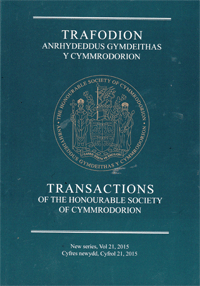 Llewellyn Wyn Griffith and the London Welch
Llewellyn Wyn Griffith and the London Welch
Delivered by Lieutenant-General Jonathon Riley
Lieutenant-General Jonathon Riley CB DSO, late of The Royal Welch Fusiliers,
served in the British Army for 39 years, chiefly abroad and in theatres of active
military operations.
He has a PhD in Modern History and is Visiting Professor in War Studies at King‘s College London. He has published 18 books to date, the latest of which is ‘Oft in Danger’: The Life and Campaigns of General Sir Anthony Farrar-Hockley (2015). He also edited the most recent edition of Llewelyn Wyn Griffith’s Up to Mametz (2010).
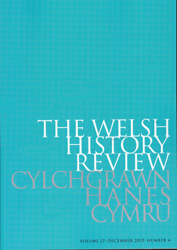 THE MILITARY GARRISONS OF HENRY IV AND HENRY V
THE MILITARY GARRISONS OF HENRY IV AND HENRY V
AT STRATA FLORIDA, 1407 AND 1415–16
JONATHON RILEY
King’s College London
ABSTRACT
This article provides an analysis of the royal garrisons deployed at Strata Florida Abbey in late 1407 and in 1415, a subject largely ignored by previous studies.
The garrison of 1407 was a punitive force during the closing stages of Glyndwˆr’s rebellion; that of 1415 was to suppress possible dissent during the absence of Henry V in the Agincourt campaign. The choice of Strata Florida is...
Christmas Day Truce December 1915
Excerpts from the Diary of Sir Iain Colquhoun
(Courtesy of The Vale of Leven - www.valeofleven.org.uk)
The Transcript - December 24th 1915
...to the Firing Line. I hold? from Duck’s Bill and slightly beyond it to Sign Post Lane. ? night but gunners very active. The Germans ? on Sunken Rd and several times during the night we got shelled out of dugout.
December 25th Xmas Day
Stand to at 6.30. Germans very quiet. Remained in Firing Trenches until 8.30. No sign of anything unusual. When having breakfast about 9 am a sentry reported to me that the Germans were standing up on their parapets and walking towards our barbed wire. I ran out to our firing trenches and saw our men looking over the parapet and the Germans outside our barbed wire.
A German officer came forward and asked me for a truce for Xmas. I replied that this was impossible. He then asked for ¾ hour (three-quarters of an hour) to bury his dead. I agreed. The Germans then started burying their dead and we did the same. This was finished in ½ hrs time. Our men and the Germans then talked and exchanged cigars, cigarettes etc for ¼ of an hour and when the time was up I blew a whistle and both sides returned to their trenches.
For the rest of the day the Germans walked about and sat on their parapets. Our men did much the same but remained in their trenches. Not a shot was fired. At night the Germans put up Fairy lights on their parapets and their trenches were outlined for miles on either side. It was a mild looking night with clouds and a full moon and the prettiest sight I have ever seen. Our machine guns played on them and the lights were removed. Our guns shelled heavily all night at intervals of ½ an hour and the Germans retaliated on Sunken Road. I had to leave my dug-out five times during the night owing to shells.
December 26th
Fine day. No? rifle firing, but no Germans showing. I went at 10 a.m. to Winchester House to explain to a Court of Inquiry my conduct on Christmas Day. The Brigadier (who came round my trenches 10 mins after my truce was over) didn’t mind a bit but the Major General (Lord Cavan) is furious about it. The Coldstreams and our 2nd Batt are also implicated. Relieved by the 1st Irish Guards. Marched out by platoons down Sunken Road and Sign Post line to Rouge Choistr. Dropped the R.W.F. and marched via Riog? Bailleul to La Gorgue at 7 p.m. and billeted there.
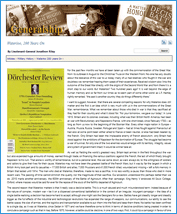 Agincourt - 1415
Agincourt - 1415
Article Featured in The Dorchester Review - By Lt-Gen Jonathon Riley
"When Henry V began his preparations for the campaign of 1415, 600 years ago this year, Simon Flete had been the Master of the Armouries in the Tower of London for seven years. He came from a family that had been involved with the business for generations: the first recorded Master in 1327, John Flete, was likely his grandfather so Simon had probably grown up with the business of securing munitions and arming troops. But although he clearly knew what he was doing, he faced a mighty challenge.
The exchequer rolls of Henry V for 1415 tell us that for a 90 day campaign by about 12,000 fighting men, wages alone would cost the king £50 per day..."
 Waterloo - 200 Years on
Waterloo - 200 Years on
Article Featured in The Dorchester Review - By Lt-Gen Jonathon Riley
"I want to suggest, however, that there are several compelling reasons for why Waterloo does still matter and the first is an idea which is very much with us in the commemorations of the Great War: remembrance. What we remember about those who died in war is that they sacrificed all they had for their country and what it stood for. “For your tomorrow, we gave our today”. In June 1815, Britain and its colonies overseas, including what was then British North America, had been at war with Revolutionary and Napoleonic France, with one short break, since February 1793 – as long as from us now to the beginning of the Bosnian War..."
Under Sir Deian Hopkin, Lt-Gen Jonathon Riley is an advisor to the Welsh government on the centenaries and is also to Chair the British Army's group supporting these events in Wales.
Framework Programme (PDF)
"The Great War Centenary in Flanders" (PDF)
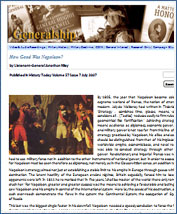 How Good Was Napoleon?
How Good Was Napoleon?
Published in History Today Volume 57 Issue 7 July 2007
By 1805, the year that Napoleon became sole head of state and supreme warlord of France, the notion of strategy was recognizably modern. Joly de Maizeroy had written in Théories de la Guerre (1777): ‘Strategy ... combines time, places, means, various interests and considers all ... [Tactics] reduces easily to firm rules, because it is entirely geometrical like fortification.’ Achieving strategic objectives through means as diverse as diplomacy, economic power, information warfare and military power is not too far from this line of thought. The sort of strategy practised by Napoleon, his allies and some of his opponents, should be distinguished from that of his ...
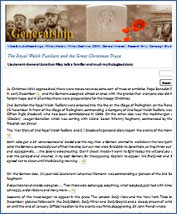 The Royal Welch Fusiliers and the Great Christmas Truce
The Royal Welch Fusiliers and the Great Christmas Truce
Lieutenant-General Jonathon Riley tells a familiar and much mythologised story
As Christmas 1914 approached, there were moves towards some sort of truce or armistice. Pope Benedict XV proposed the idea in early December (1) and the Germans accepted almost at once, with the proviso that everyone else did the same. That was a forlorn hope, but in all armies there were preparations for the troops’ Christmas. 2nd Battalion the Royal Welch Fusiliers were ordered into the line at the village of Frelinghien on the French/Belgian border on 25 November. In front of the village of Frelinghien, commanding A Company of 2nd Royal Welch Fusiliers...
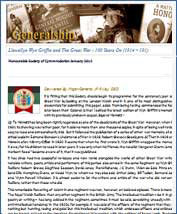 Llewellyn Wyn Griffith and The Great War - 100 Years On (1914 – 1918)
Llewellyn Wyn Griffith and The Great War - 100 Years On (1914 – 1918)
Honourable Society of Cymmrodorion January 2014
It is fitting that this Society should begin its programme for the centenary year of the outbreak of the Great War by looking at the London Welsh and in it, one of its most distinguished former members. My credentials for submitting this paper, aside from being having commanded the Royal Welch Fusiliers and later been their Colonel, is that I edited the latest edition of Wyn Griffith’s memoir, Up to Mametz, along with its previously unknown sequel, Beyond Mametz. 1
In The Shadow of Vienna
Four months after the fall of Napoleon, as plans were being agreed for a great peace congress to be held in Vienna in September, three British and five American negotiators met in the small town of Ghent in the newly-independent nation of Belgium. Their task was to frame a treaty that would end the war that had begun with James Madison’s declaration on 18 June 1812 – a war which almost no-one in Britain and many in the United States had never wanted. A war that was as much as anything the result of strategic miscalculations on both sides...
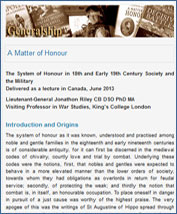 "A Matter of Honour"
"A Matter of Honour"
The System of Honour in 18th and Early 19th Century Society & the Military
The system of honour as it was known, understood and practised among noble and gentle families in the 18th and early 19th centuries is of considerable antiquity, for it can first be discerned in the medieval codes of chivalry, courtly love and trial by combat. Underlying these codes were the notions, first, that nobles and gentles were expected to behave in a more elevated manner than the lower orders of society, towards whom they had obligations as overlords in return for feudal service; secondly, of protecting...
In the week of 18 June 1812, Napoleon’s Grande Armée crossed the river Nieman into Russia, heading for Borodino; and Wellington crossed the Agueda River from Portugal into Spain, heading for Salamanca. Both crossings were to prove fateful, if not decisive. Almost to the day, President James Madison crossed a Rubicon his own by declaring war on Great Britain and beginning the attempt to bring all of British North America under the flag of the United States. Of course, this coincidence of events could not be known at the time...
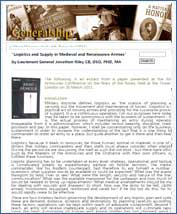 Arms & Armour
Arms & Armour
Foreword by JP Riley
An extract from a paper presented at the Royal Armouries Conference on the Wars of the Roses, held at the Tower of London by Lt-Gen Jonathon Riley
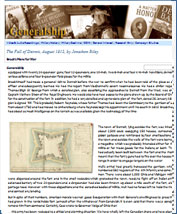 The Fall of Detroit
The Fall of Detroit
Published in Canadian Military, vol 18 Issue 9, Sept 2011
Shortly before the turn of the year 1811, Major-General Isaac Brock had been in Upper Canada for about 5 years. Believing war with the USA inevitable, he sent a despatch to Governor-General Sir George Prevost in Quebec, summarising his view of the situation in the Upper Province. Being by nature an impulsive and offensively-minded commander, he thought that simply sitting back and waiting for an American invasion would be to invite defeat: the citizens would be disheartened ...
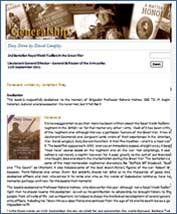 "Duty Done" 2nd Battalion Royal Welch Fusiliers in the Great War
"Duty Done" 2nd Battalion Royal Welch Fusiliers in the Great War
Foreword by JP Riley
It is no exaggeration to say that more has been written about the Royal Welch Fusiliers than any other regiment in the British - or for that matter any other - Army. Much of it has been written by members of the regiment and although this was a particular feature of the Great War, it has been true since Lieutenant Saumarez and Sergeant Lamb wrote of their experiences in the American Revolutionary War. David Langley's.
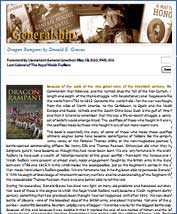 "Dragon Rampant" by Donald E. Graves
"Dragon Rampant" by Donald E. Graves
Foreword by JP Riley
Because of the scale of the two great wars of the twentieth century, the long stand-off with Communism that followed, and the turmoil since the fall of the Iron Curtain, we tend to forget the length and depth of the titanic struggle with Revolutionary and Napoleonic France that so consumed the world from 1792 to 1815. Consume the world it did - for the war was fought in a thousand places: from the wilds of North America, to the Caribbean, to Spain and the Mediterranean, to Central Europe and Russia...
 Napoleon As A General
Napoleon As A General
By Jonathon Riley
Any attempt to assess Napoleon’s success or failure as a General must first establish what we mean by a General, and Generalship. At the outset, one must be clear that this is not a discussion about the peacetime role of General officers, since they will be judged by standards of professional competence; this is a discussion about Generalship in war...
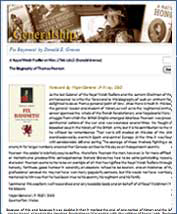 "Fix Bayonets"
A Royal Welch Fusilier at War, 1796-1815 (Donald Graves)
"Fix Bayonets"
A Royal Welch Fusilier at War, 1796-1815 (Donald Graves)
The Biography of Thomas Pearson
Foreword by JP Riley
"As the last Colonel of the Royal Welch Fusiliers and the current Chairman of the Regimental Trustees, I am honoured to write the foreword to this biography of such an eminent Royal Welchman. I am also delighted to do so from a personal point of view, since there is much in this book which is of interest to the general reader and student of history as well as to the regimental enthusiast. Thomas Pearson's career..."
 An Expeditionary Army: The Mirror of 1914
An Expeditionary Army: The Mirror of 1914
As the British armed forces develop their expeditionary role in these closing years of the twentieth century, the process of development of an expeditionary capability in the first decade of this century offers some interesting parallels. In geography, of course, the situation was a reversal of the present circumstances: where eyes are now turning away from the continent of Europe after more than fifty years of European peace, in 1902, although imperial matters remained the first priority, British eyes began to turn back to the continent...
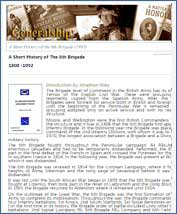 A Short History of The 6th Brigade,
1808 -1992
A Short History of The 6th Brigade,
1808 -1992
Introduction by JP Riley
The Brigade level of Command in the British Army has its origins in the Tertios of the English Civil War. These were groupings of three regiments, copied from the Spanish Army. After the Restoration, Brigades were formed for service both in British and foreign service but until the beginning of the Peninsular War it remained an ad hoc grouping adopted only on active service and with no real command structure.
